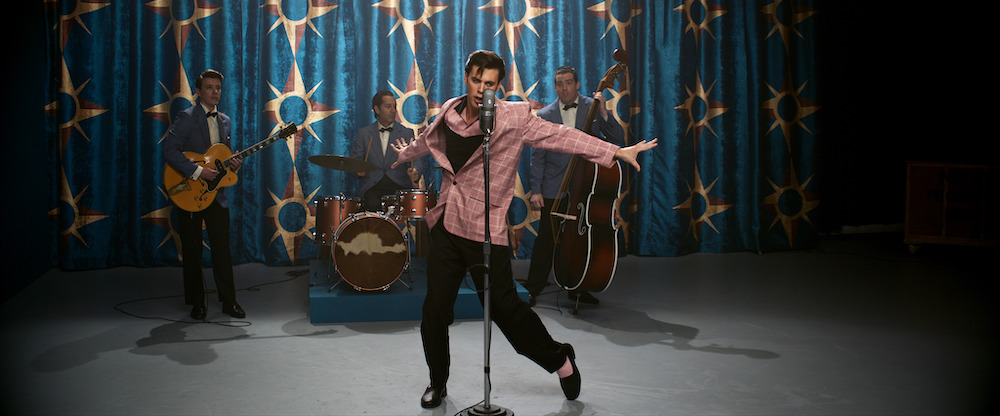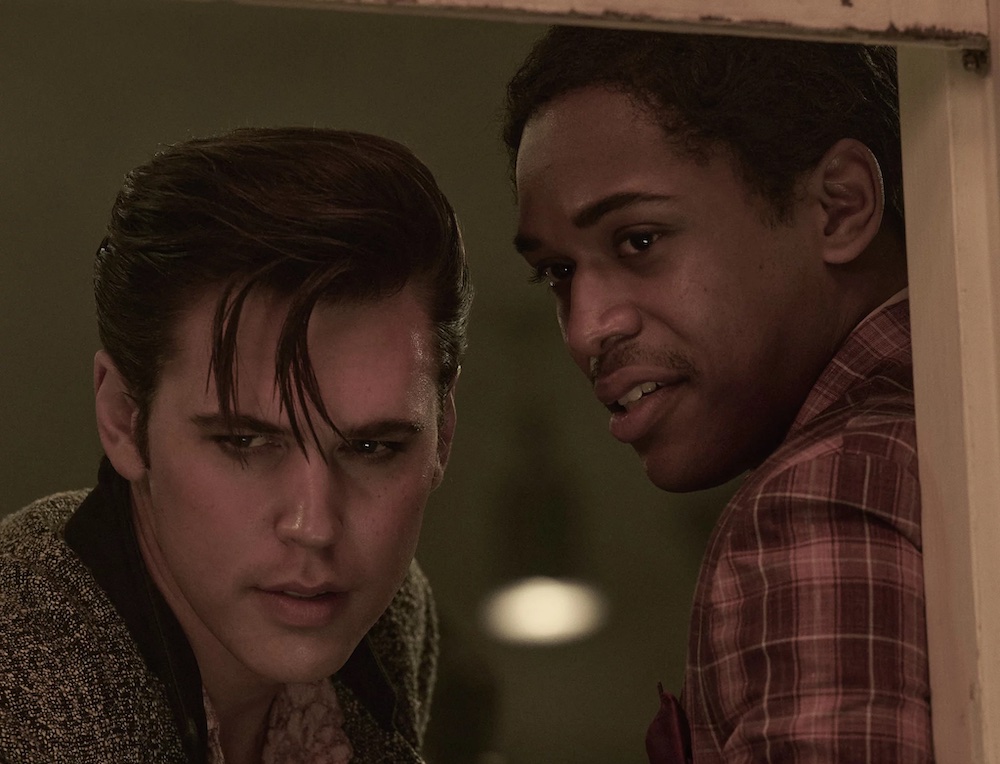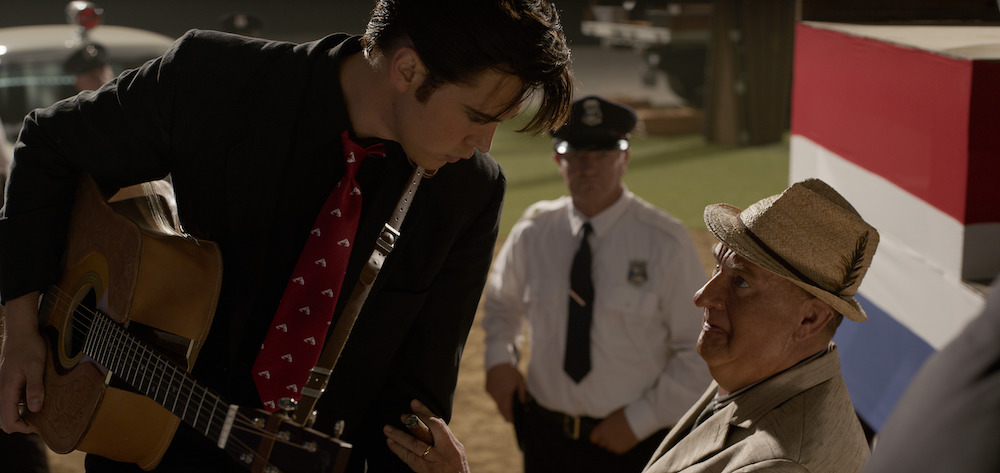Basically: The story of Elvis Presley, told by his antagonist Colonel Tom Parker in the most Baz Luhrmann way possible.
I have a weird appreciation for Elvis. When I was a child, Elvis had become like a cartoon of himself—a mascot of a time long gone by. He was impersonated by many and turned into cartoon characters. I grew up in the time of the king of pop, Michael Jackson. There was no other king, and rock was far removed from rock n’ roll. Even when I did see Elvis as a child, my great-grandmother hipped me to the legacy of his songs not being his, or as old Black folks said: He stole them. My great-grandmother gave me a different perspective on old artists like Elvis or Jerry Lee Lewis and their place in American music. Especially with Elvis, our conversations were about the white artists who are influenced by and make music like Black artists yet get an insane amount of credit and success—but there is a cost.
While watching this, something that also rang out in my head was Chuck D’s lyric in “Fight The Power”:
Elvis was a hero to most, but he
Never meant shit to me, you see, straight out
Racist—that sucker was simple and plain
Motherfuck him and John Wayne
And while the lyric hits hard, I also feel it’s unfair to Elvis. Later on, when Chuck D would speak about the song, his stance softened (not so much for John Wayne, which is well deserved).

I didn’t know much about this film going in, only that Baz Luhrmann is the director and somehow Tom Hanks plays the terrible Colonel. Elvis starts with Colonel Tom Parker, close to death, talking directly to us in the most over-the-top way possible. This only works because of the wildly over-the-top way he tries to make it seem like he didn’t ruin and exploit Elvis his whole life. Austin Butler plays adult Elvis and he does a good job. He has a look and he moves well. Butler brings about a very humanizing portrayal.
Elvis moves so fast in the opening 20 minutes that I was pretty shaky at first. However, once it settles into things, the film uses Elvis as a commentary on the evils of the modern American music business, capitalism, and the relationship between white Americans and the creations of Black Americans. Within that, it looks at appropriation and people who might be a little too close to Blackness than society feels they should be…and, honestly, pimping and hoeing. ’Cause, let me tell you, the film plays with Elvis basically becoming a prostitute indentured to Colonel Parker with no happy ending.
Tom Hanks does an excellent job of making you hate his character. Tom Parker is slimy, conniving, duplicitous, greedy—all the bad things a person can be. Elvis shows you he’s a carny who uses every technique he can to get what he wants and trick people out of damn near their souls. Hanks’ performance may not be for everyone—it can feel cartoonish and, at times, overwrought and underwrought. Yet, for me, it dances the line the perfect amount to counter Elvis.

It’s hard to dislike Butler’s Elvis. He’s a beautiful thing destroyed by circumstances beyond his control. But let me go back to what I said earlier: The way it shows issues of race in music—and how Elvis uses blues artists’ songs—might turn some people off. Kelvin Harrison Jr. portrays B.B. King who is Elvis’ friend. At times, B.B. King gives Elvis the right amount of advice—a musical Obi-Wan Kenobi, you could say. They meet when Elvis must go back to the streets of Memphis, the Black area, which makes him a pariah in the poor white community he’s from.
I can’t help but think of all the white artists post-Elvis who come from appropriation or still do it. You have people like Miley Cyrus who borrow from Black artists for a while and shed it later; you have ones like Justin Timberlake or Bieber who stick with it for a long time and stay closely aligned; then you have the Teena Maries who essentially become “Black” artists their whole career. I think Baz was trying to work a conversation about appropriation into the story and visuals. Even if it doesn’t always come together, it makes you feel. Why do none of the Black artists around Elvis confront him? Why are they so cool with him when I know Black people of that time were not? I’ve seen the interview with Ray Charles and his glaring criticism of Elvis. None of that is in the film. It speeds through things Baz doesn’t find interesting yet uses some good anachronistic music well in those places. Baz really didn’t care about all those dang-gone movies Elvis was in.

Elvis brings you to the tumultuous year of 1968 when Elvis finally asserts himself in a TV comeback special and makes something that feels authentic. He is supposed to make a Christmas special but he goes off-script and gets back to his roots. This part is edited amazingly, with touches of the filmmaking aesthetics from that time, carefully remaking the look of that special down to the last detail. You see Parker losing his grip on Elvis even though, not soon after, he ends up getting an even tighter hold. At this moment I felt like I was watching The Deuce on HBO with Elvis and Parker’s dynamic. The hate you’ll feel for that man—woo boy!
Although the movie doesn’t end happily, I feel Baz is trying to say that, yes, Elvis had some issues. Still, he never really had an opportunity to be himself fully or to show his appreciation for the music he was making because of Parker, a human devil. In the end, Baz tries to make more and more allusions to the next king of music and his tragic death as well. It’ll make you realize just how young Elvis was when he died and how all his potential was completely lost.
I must say the costuming, hair, and makeup teams are already an Academy Award contender for next year. It’s impeccable work and I was amazed by the whole film. I joked with my friend that this is going to be white folks’ Belly—you could watch Elvis without sound and still be captivated. The writing and acting are leagues beyond that film, but its beauty can’t be talked about enough.
Finally, playing an Eminem song over the credits is very inspired. I almost clapped at the screen because of how smart its placement is.
In the End: Elvis is a journey through the life of one of the most iconic pop culture figures in US history, told in a film that is grand in scale and worthy of the subject. It’s another Baz Luhrmann banger.



